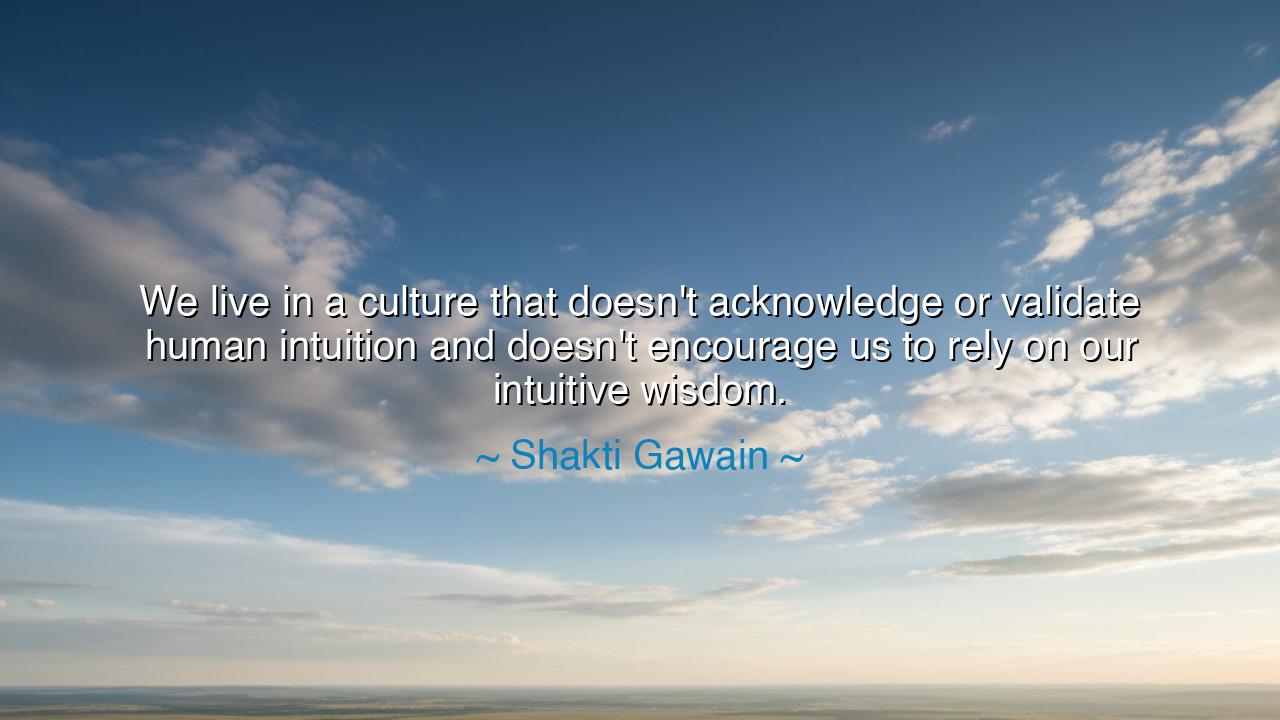
We live in a culture that doesn't acknowledge or validate human
We live in a culture that doesn't acknowledge or validate human intuition and doesn't encourage us to rely on our intuitive wisdom.






Shakti Gawain, visionary of the inner life, laments that we dwell in a culture that scorns the secret strength of intuition. She declares that the world exalts logic, calculation, and outward measure, but does not acknowledge nor validate the deep wisdom that rises unbidden from the heart. The soul speaks softly, but the noise of society drowns it, leaving men estranged from their own inner guide. In these words is a summons to remembrance: that within each spirit dwells a compass more ancient than books, more faithful than laws.
The ancients honored this truth with reverence. The Greeks called it the daimon, the inner voice that whispered to Socrates and stayed his hand from folly. He confessed that it never taught him wisdom directly, yet always warned when he was about to stray. This was no madness, but the voice of intuition, honored as divine. Shakti reminds us that what was once sacred has been cast aside, replaced by a worship of reason alone, leaving man half-blind, for reason without intuition is a sword without a hand to wield it.
History too bears witness. Consider Joan of Arc, a peasant girl with no schooling, who claimed no knowledge of war nor statecraft. Yet she followed the voice within her, the intuitive wisdom she believed to be heaven’s call. By it she rallied armies, crowned a king, and altered the fate of France. Scholars and generals scoffed at her, but her obedience to intuition accomplished what their cleverness could not. Here we see that the world may mock intuition, but destiny bends to those who heed it.
Yet in our age, men are trained to distrust their inner knowing. From childhood they are told to silence the heart and obey only the outward authority of numbers, systems, and experts. But the fruit of this has been imbalance: a society clever in invention but poor in meaning, rich in knowledge but starved of wisdom. Shakti’s words pierce through this emptiness, calling us back to the forgotten well within.
Let this be the teaching for generations to come: intuition is not weakness, but strength; not illusion, but a hidden form of truth. To honor it is to restore balance between mind and soul, reason and spirit. The culture that despises intuition walks with one eye shut; but the man or woman who listens to the inner voice walks whole, guided not only by the world’s wisdom, but by the eternal flame within.






CHCuong Hoa
I find this statement both validating and challenging. It resonates with the idea that intuition is undervalued, but it also raises a practical concern: how do we distinguish true intuition from wishful thinking or bias? Can intuition be taught, or is it something that emerges naturally with self-awareness and reflection? I wonder if some cultures or communities historically placed more trust in intuitive wisdom, and what lessons we could learn from them to enrich contemporary decision-making.
BDBall Dragon
This perspective provokes reflection on personal experience. I often notice moments when gut feelings point the way, but societal pressures push me to ignore them. Are we conditioned to mistrust our instincts because intuition is hard to quantify or validate publicly? It also makes me question whether intuition itself can be refined and strengthened, like a skill, or if it’s inherently spontaneous and mysterious. How can we create spaces that encourage intuitive exploration alongside analytical thought?
VDTruong Van Dat
I feel concerned reading this because it suggests that many people may be disconnected from their own inner guidance. Does our educational system inadvertently suppress intuitive thinking by emphasizing standardized methods and rigid problem-solving? I wonder how this impacts creativity, decision-making, and emotional intelligence. Could training ourselves to trust intuition lead to better personal and professional outcomes, or is intuition too subjective to rely on reliably?
LANguyen lan Anh
This idea feels both enlightening and frustrating. It makes me wonder why modern society prioritizes logic, data, and measurable outcomes over intuitive understanding. Are we missing valuable insights because we undervalue gut feelings? I’m curious about the balance between intuition and rational thinking—can we cultivate a culture that respects intuition without dismissing evidence-based reasoning? Perhaps intuition is an underutilized resource that could guide innovation and personal growth.